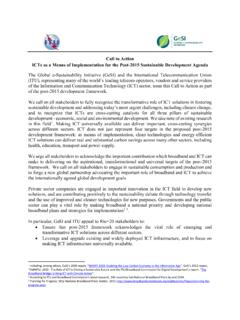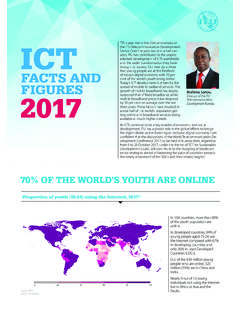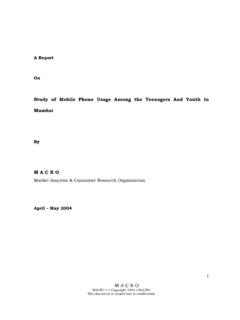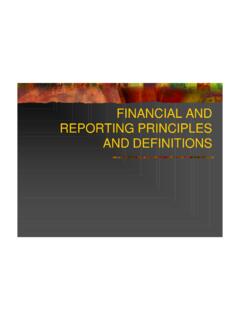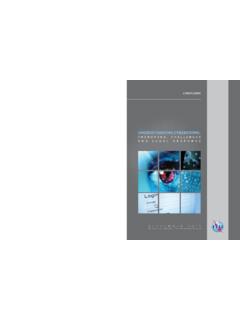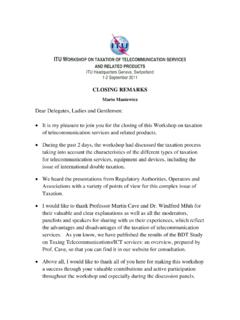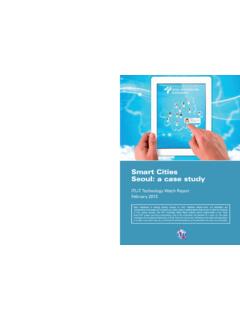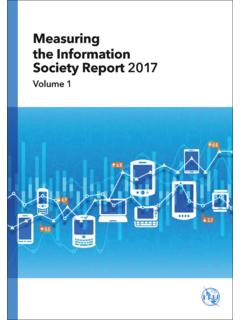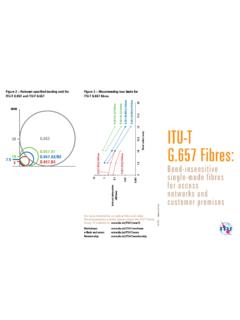Transcription of Global Cybersecurity Index 2020
1 ITUP ublicationsGlobal Cybersecurity Index2020 international Telecommunication UnionDevelopment Sector Global Cybersecurity Index 2020 Global Cybersecurity Index 2020 Measuring commitment to cybersecurityAcknowledgementsThe Global Cybersecurity Index (GCI) is an initiative of the international Telecommunication Union (ITU), the UN specialized agency for ICTs, shaped, and improved by the work of a diverse range of experts and contributors within countries and other international organizations. ITU would like to acknowledge and thank all partners and contributors for their hard work and commitment in providing support to the GCI, and more importantly, helping to advance our collective understanding of Cybersecurity would like to especially highlight the contributions received through ITU-D Study Group 2, and the Telecommunication Development Bureau (BDT) Management Consultation Group, and their work on changes to the GCI questionnaire.
2 The BDT Cybersecurity team would like to thank ITU membership for their nominations of experts to advise in the weightage process. More information about the weightage process and expert participation can be found in the methodology. The inputs of the following experts from ITU membership provided invaluable support in assigning weighting determinations: Mr Abdelaziz Alzarooni (Telecommunications And Digital Government Regulatory Authority (TDRA), United Arab Emirates), Prof. Dr. Marco Gercke (Cybercrime Research Institute GmbH, Germany), Ms Melissa Hathaway (The Potomac Institute for Policy Studies, United States of America), Vanessa Copetti Cravo (ANATEL, Brazil), Mr Scott James Shackelford (Indiana University, Program on Cybersecurity and Internet Governance, United States of America), Mr Gueric Goncalves (ANNSI, Benin), Pr.
3 Eng Emmanuel Thekiso (BOCRA, Botswana), Mr Dlamini ( ministry of ICT, Eswatini), Mr Fillemon Johannes ( ministry of Information and Communication Technology, Namibia), Mr Palakiyem ASSIH (Cyber Defense Africa , Togo), Mr Nawa J. Samatebele (Zambia Information & Communication Technology Authority, Zambia), Mr Gonzalo D az de Vald s Olavarrieta (Chile), Ms Jessica Machado lvarez (Administration of Cuba, Cuba), Eng. Raquel Pi a (Venezuela), Mtro. Jacobo Bello Joya (The National Guard of the Secretariat of Security and Citizen Protection, Mexico), Mr Renzo Zegarra (Ministerio de Transportes y Comunicaciones, Peru), Mr Junior McIntyre (The Caribbean Telecommunications Union (CTU), Trinidad and Tobago), Mr Fernando Hernadez (The Uruguayan Communications Regulator, Uruguay), Ms Anne-Rachel Inn (American Registry for Internet Numbers (ARIN), United States of America), Mr Mohammad Odeh Alsalamin (Jordan)
4 , Ms Nada Khater ( ministry of Digital Economy and Entrepreneurship, Jordan), Mr Yusuf Ahmed Buhijji ( ministry of Transport and Communication, Kingdom of Bahrain), Mrs Aziza Al Rashdi ( ministry of Transport, Communication and information Technology, Oman), Mr Abdulrahman AlHassan (National Cybersecurity Authority (NCA), Saudi Arabia), Eng. Mohammad Alawi ( ministry of Telecomm. & Information Technology, State of Palestine), Mr Khalili Urahman Kabirzoy (Afghanistan Root Certification Authority(ARCA), Afghanistan), Mr Nasratullah Ghafoory (Afghanistan Root Certification Authority(ARCA), Afghanistan), Ms Xu Ming ( ministry of information and Technology, National Computer Network Emergency Response Team, China), Ms Wan Xinxin ( ministry of Information and Technology, National Computer Network Emergency Response Team, China), Ms Catherine M.
5 Subhyadas(Department of Communications, Fiji), Puan Lyana Shohaimay ( ministry of Communications and Multimedia, Malaysia), Puan Nurul Adiah Hani Husin ( ministry of Communications and Multimedia, Malaysia), Mr Yan Naung Soe (National Cyber Security Center, Information Technology and Cyber Security Department, Myanmar), Mr Jakkrapong Chavong ( ministry of Digital Economy and Society, thailand ), Mr Alan Olegovich Khubaev (Department of Information Security, Russia), Mr Andrey Sergeevich Zhivov (Department for international cooperation , Russia), Mr Ilgyz Turganbaev (State Committee of Information Technologies and Communications of the Kyrgyz Republic, Kyrgyz Republic), Mr Muhamedjan Alymkulov (State Committee of Information Technologies and Communications of the Kyrgyz Republic, Kyrgyz Republic), Mr Vladimir Yuryevich Shurin (Department of Information Security of the Security Service of the Republican Unitary Enterprise, Belarus)
6 , Mr Nestoras Chouliaras (General Secretariat of Telecommunications & Post ministry of Digital Governance, Greece), Ms Egl Vasiliauskait ( ministry of National Defence of the Republic of Lithuania, Lithuania), Mr Tadas ak nas ( ministry of National Defence of the Republic of Lithuania, Lithuania), Mrs Radoja (Serbia), Mr Matej alm k (National Cyber Security Centre SK-CERT, Slovakia), Mr Rastislav Janota (National Cyber Security Centre SK-CERT, Slovakia), Mr Aidan Murchland (United Kingdom), Mr Miguel Pinto (BitSight, United States of America), Mrs Nunil Pantjawati (Indonesia), Mrs Intan Rahayu (Indonesia), Mr Makaireh JONGA (Gambia Computer Security & Incident Response Team (gmCSIRT), Gambia), Ms Banchale Gufu (Kenya), Ms Sonam Choki(Department of Information Technology and Telecom, Bhutan), Aqeel Taha Saadoon (ICT SECRETARIAT, Iraq), and Thar Kadhim Ali (CERTIraq, Iraq).
7 The ITU Cybersecurity team would like to thank the GCI focal points, who collected data from across their respective countries regarding Cybersecurity commitments. This report would not have been possible without the GCI country focal points. The team is grateful to the many ITU colleagues and interns that provided support to this team apologizes to any individuals or organizations inadvertently omitted from this list and expresses its gratitude to all who contributed to the GCI. Please contact the ITU Cybersecurity team at gci@ itu.
8 Int with any comments or inquiries in respect to this publication. ITU 2021 All rights reserved. No part of this publication may be reproduced, by any means whatsoever, in part or in full, without the prior written permission of designations employed and the presentation of the material in this publication do not imply the expression of any opinion whatsoever on the part of ITU concerning the legal status of any country, territory, city or area or of its authorities, or concerning the delimitation of its frontiers or boundaries.
9 The mention of specific companies or of certain manufacturers products does not imply that they are endorsed or recommended by ITU in preference to others of a similar nature that are not mentioned. Errors and omissions excepted, the names of proprietary products are distinguished by initial capital reasonable precautions have been taken by ITU to verify the information contained in this publication. However, the published material is being distributed without warranty of any kind, either expressed or implied.
10 The responsibility for the interpretation and use of the material lies with the reader. The opinions, findings and conclusions expressed in this publication do not necessarily reflect the views of ITU or its : 978-92-61-33921-0 (Electronic version) 978-92-61-33931-9 (EPUB version) 978-92-61-33941-8 (Mobi version)ivForewordThe need for a safe and secure cyberspace has become more important than ever, especially as we all grow increasingly dependent on digital lifelines . One of the greatest challenges of the COVID-19 pandemic has b
